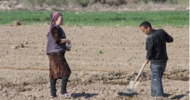Devinder Sharma talks about landgrabbing in the context of the world food crisis on "Democracy Now!"
- Democracy Now!
-
14 October 2009
The UPA Government has deprived job opportunities to millions of illiterate and semi-literate Indians by forcing Indian companies to invest abroad in overseas plantations and coal mining sectors.
- Organiser
-
13 October 2009
Al Amoudi has a new company whose purpose is to grow food in Ethiopia for Saudi Arabia.
- Addis Fortune
-
12 October 2009
The Solvent Extractors Association, the Indian oilseeds industry body, has formed a consortium of 18 companies to acquire 10,000 hectares of prime farmland in a $40-million deal in Uruguay and Paraguay to cultivate oilseeds and pulses. The association says they are hamstrung only by access to finance, otherwise they have it all sewn up.
- Times of India
-
29 September 2009
Ramakrishna Karuturi does not feature on any international power list. Perhaps he should.
- Times of India
-
26 September 2009
The 'Food Pirates' are fast expanding their network, their reach and their control over land. And it is happening fast in our own neighbourhood, writes Devinder Sharma.
- Ground Reality
-
24 September 2009
"The real worry is that IRRI may help Saudi Arabia produce aromatic rice varieties in Pakistan where these countries have bought large tracts of lands," food policy commentator Devinder Sharma said. "India and Pakistan are already bitter rivals in the Basmati export segment."
- India Today
-
22 September 2009
In the Philippines, a land lease hotspot like Cambodia or Laos, a series of high-profile deals has clashed with long-running demands for agrarian reform including land redistribution.
- World Mission Magazine
-
20 September 2009
Civil society, including African farmers unions, need to educate local people that such land deals are not in their interests, however couched in 'win-win' terminology they appear to be.
It is unfortunate that even as deals that involve land which should belong to the people of Pakistan are struck, there has been so little public debate about the plan. We need to be informed of what is planned. Protests need too to be mobilized. In the prevailing political environment of Pakistan, the people who stand to lose the most have almost no spokesmen.
- The News
-
17 September 2009
The government should enhance rural funding and at the same time curtail federal non-development expenditures in order to avoid leasing country’s land to foreign investors.
- Daily Times
-
16 September 2009
PAVA offers its shares to Gulf investors for food supplies. It will start road show to UAE and Saudi in October.
- Reuters
-
15 September 2009
Ethiopia’s government ruling tribal junta has defended its plan to offer 2.7 million hectares of farmland to foreign companies despite millions of citizens who need food aid from the international community.
- EthioPlanet
-
15 September 2009
Sheik Mohammed Hussein Ali Al Amoudi, the second richest person in Saudi Arabia, is preparing to farm cereals on hundreds of thousands of hectares of Ethiopian land for export to Saudi Arabia
- Addis Fortune
-
14 September 2009
The problem is that we will lose control. Of course, some regulatory framework will be put in place, but it will also include ceding of control over our land resource to foreigners for a yet-to-be-specified time period.
- Business Recorder
-
10 September 2009
A group of private Saudi investors said they plan to start a company with $533.3 million capital that will invest in farm projects mainly abroad. First projects may be with Ghana, Turkey and Kazakhstan.
- Reuters
-
09 September 2009
An internal document recently posted on IRRI's website reveals that the Institute has been advising Saudi Arabia in the context of its strategy to acquire farm land overseas for its own food production.
South Africa is joining a “green rush” for the African continent. The Republic of the Congo has offered Agri SA 10-million hectares for South African farmers to produce maize and soya beans as well as to establish dairy and poultry farms.
- Mail & Guardian
-
08 September 2009
In June 2009, the Indian company Karuturi took up intensive farming in Ethiopia. The harvest will be exported to Asia and Europe.
- L'Hebdo
-
03 September 2009
Pakistan's Ministry of Investment has decided to offer more than 7 million acres of farmland for long-term investment to the Emirates Investment Group and others. China and Saudi Arabia are also interested.
- Daily Times
-
02 September 2009
The Bangkok Post asked two prominent figures to discuss the pros and cons of foreign farmland ownership.
- Bangkok Post
-
31 August 2009
Ginbot 7 unequivocally believes that Ethiopian sovereignty trumps contractual obligations.
Ethiopia is on the defensive over a plan to offer 2.7 million hectares of land to foreign, mainly Asian, companies despite millions crying out for food aid from the international community.
- Business Daily
-
14 August 2009
A private agricultural investment firm in Abu Dhabi plans a Dh925 million (US$251.8m) farmland deal in Egypt to grow wheat for the African nation’s domestic market.
- The National
-
13 August 2009
If the moratorium on agricultural land sale is lifted, rich multinational corporations will buy and it will be legislatively impossible to strip them of lands that could be used for feeding Ukrainians.
Ethiopian government has defended its plan to offer 2.7 million hectares of farmland to foreign companies despite millions of citizens who need food aid from the international community.
- Daily Nation
-
13 August 2009
The terms of farmland deals are hardly made public. Although a theoretical possibility exists in a few cases for some transfer of technology for agricultural development, risk also exists to peasant farmers who cannot compete with well-resourced commercial farms. Take, for instance, the case of barley and oilseeds producers in Ethiopia.
- Abugida Info
-
13 August 2009
The consensus is that Africa is being out-gunned. While regulations & rules are debated, the amount of land being bought up by foreign investors is increasing at a rapacious speed.
- Deutsche Welle
-
13 August 2009
To be brutally honest, mutual interest is the opposite of what investor countries are looking for
Emami Biotech's project has already begun at Awash Sebat Kilo some 250 km east of the capital Addis Ababa growing Jatropha, sunflower, castor, pulses and various herbs at a cost of $24 million.















